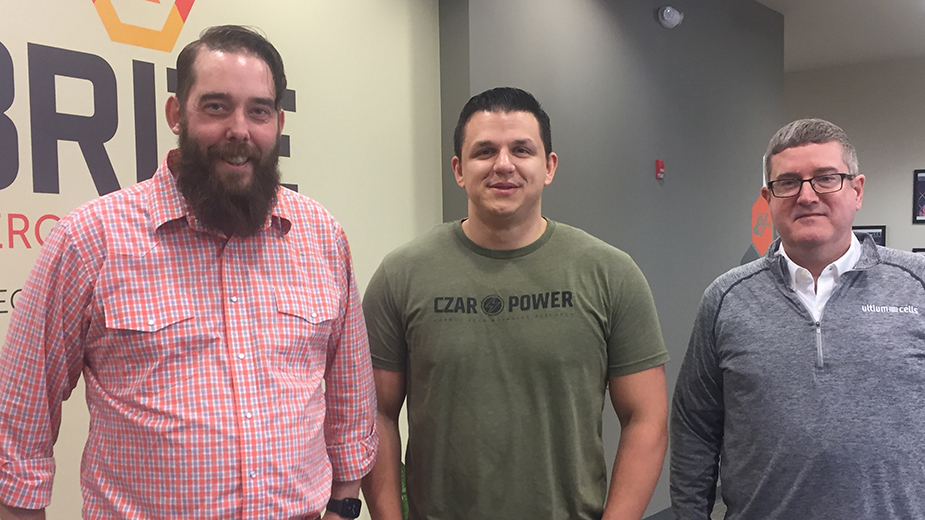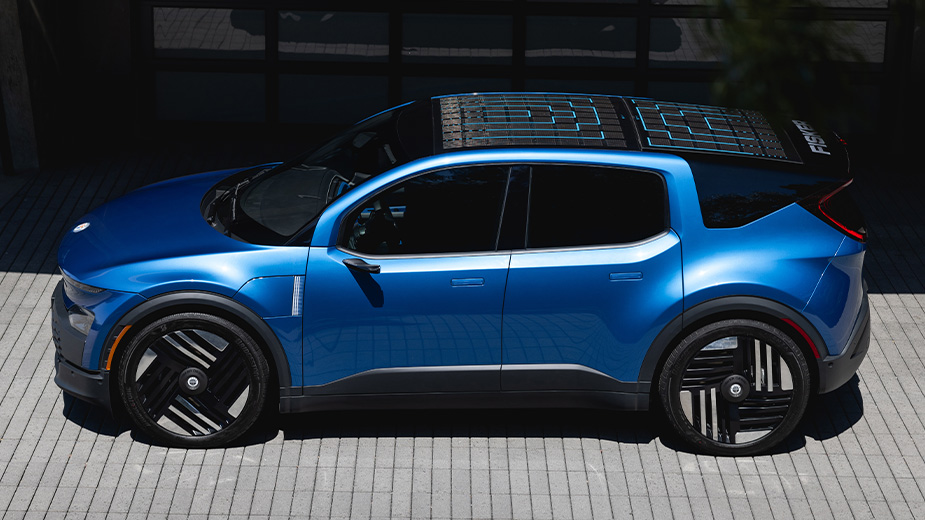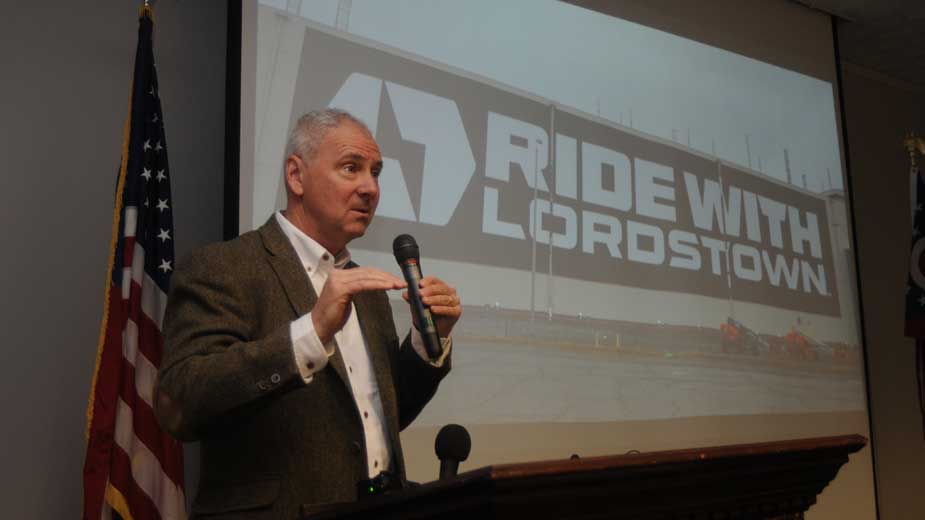Brite Energy Plugs into Voltage Valley
WARREN, Ohio — Inspiration and ideas can come to entrepreneurs in the unlikeliest of places. For the CEO and co-founder of Czar-Power, his inspiration arrived in the middle of a war zone.
While serving in Afghanistan, Tony Frisone observed the difficulties U.S. military convoys encountered as they hauled diesel fuel to remote outposts across the rugged terrain of that country. The cumbersome logistics convinced Frisone that there must be an easier way to store and deliver energy.
The answer was to develop a system that integrates multiple forms of clean and renewable energy into a single device, streamlining how power is delivered to users.
“We have this sprawling grid-tied infrastructure. And 80% of the energy is not renewable,” Frisone says of the present electrical grid in the United States. “We’ve outgrown it.”
Moreover, the grid is likely to shoulder additional pressure as the country moves toward adoption of electric vehicles and other zero-carbon initiatives, Frisone says.
Czar, an acronym for Carbon Zero Advanced Research, is one of the portfolio companies that operates out of Brite Energy Innovators, an energy incubator based in downtown Warren.
Brite nurtures and counsels early-stage businesses and startups throughout Ohio that are focused on the development and commercialization of new technological advances in the energy sector.
As he was finishing his military service, Frisone sought out a long-time friend, Jerome Wang, who was completing his Ph.D. work at the Massachusetts Institute of Technology.
Together, the pair developed a simplified product that he says could revolutionize how clean energy is delivered to commercial businesses and homes.
Czar-Power was formed in 2015.
The company’s product is a small multifunctional unit that has the capability to “fast” charge an electric vehicle and connect with solar energy or other alternative energy sources, Frisone says.
As it stands, those looking to tap into clean energy power must also invest in separate and costly solar inverters, battery inverters, and other systems that help to regulate energy distribution, Frisone says.
Czar’s product condenses these functions into a single unit at a reduced cost. An average box is priced about $6,000, while an existing solar and DC Fast Charge system could cost as much as $21,000, according to the company website. Should users need more power, they can purchase additional units to meet their needs.
“By combining these, you make the system more efficient,” he says.
Frisone says Czar is preparing to close on $6 million worth of funding to bring the device to market, which he expects to be sometime in the fourth quarter. Initially, the company will target potential commercial users but could adapt it to the residential market in the future.
“We’re slated to kick off a few pretty high-profile demonstrations in Boston, Los Angeles, Vermont and probably Ohio,” he says.
Frisone, born and reared in Akron, saw an opportunity with Brite after being introduced to Brite President and CEO Rick Stockburger, a fellow veteran.
He credits the team at Brite for helping to secure at least $3 million of the latest funding he hopes to close. “The other connections that Rick and his team have made out there are incredibly important,” he says.
Aside from the Los Angeles Cleantech Incubator and Greentown Labs in Boston, Frisone says he knows of no other organization so proficient in energy research, development and startups. “You have Boston, LA, and Warren, Ohio,” he says. “This is very special.”
Stockburger, now in his fourth year at Brite, says connecting with meaningful partners is critical to helping the organization and its portfolio companies grow.
Many of the companies Brite works with are in the e-mobility space, Stockburger says, such as electric vehicles or drones. The organization also deals with companies engaged in energy storage, batteries and related technologies such as EV charging infrastructure and alternative energy sources.
Stockburger says Brite boasts 42 portfolio companies. All but one – SuLo, a charging company based in Pittsburgh – are located in Ohio.
“We offer mentorship,” Stockburger says. “At the end of the day, it’s connecting our network, whether it’s funding or potential customers.”
Czar-Power, for example, is in discussions with GM Defense for potential application of its product, Stockburger says. “We want to give these companies unfair advantages to be successful.”
In 2021, Brite portfolio companies secured investments of approximately $40 million, most of which were the result of direct introductions by Brite, Stockburger says.
Small startups in the Brite building at 125 W. Market St. receive discounted leasing rates. That rate grows each year as the revenues of a company increase.
Larger startups also have a significant presence. Ultium Cells LLC, a joint venture between General Motors and LG Energy Solution, has leased a large portion of the space in the building, Stockburger says. Ultium is building a $2.3 billion electric-vehicle battery cell manufacturing plant in Lordstown.
The human resources manager at Ultium, Chris Allen, says Brite has helped to build a dynamic ecosystem that encourages collaboration.
“Rick introduced us to a startup company that does transportation and we’re possibly looking to use them for the benefit of some of our employees,” he says. The company focuses on underserved areas in need of access to transportation. “That model fit into what we were looking at.”
No deal has been signed, Allen says, but emphasizes these are the sort of relationships that percolate from the entrepreneurial culture at Brite.
Ultium uses space at Brite for training and recruiting purposes.
“They’ve been very welcoming to us,” Allen says. “It’s been great. If someone is looking to start a company that is focused on this type of infrastructure, this is the place to start. They allow you to focus on what you need to do.”
Brite has grown through funding from grant opportunities and philanthropic support, Stockburger says. The organization operates on a $2 million annual budget.
In March, Brite applied for $11.25 million from the federal government’s Build Back Better Challenge Grant, part of an overall $75 million request submitted by a consortium in northeastern Ohio led by the Manufacturing Advocacy and Growth Network, or Magnet. The Northeast Ohio proposal is among 60 finalists in the country out of more than 500 applicants. As many as 30 winners will be selected in September.
Should Brite be successful in securing funding, the plan is to use some of the money to renovate the former RG Steel office building in Warren into a battery-testing site and workforce training center, Stockburger says.
“We’ve partnered with Youngstown State University and Eastern Gateway Community College, as well as MegaJoule Ventures,” a startup company at Brite, Stockburger says.
Brite’s reputation is strong outside the Mahoning Valley, as evidenced by a recent invitation to Stockburger to speak at a clean energy technology conference in Denver.
“They’re interested in what’s happening in the Voltage Valley and how we’re taking a regional approach to growing what is becoming a meaningful ecosystem,” he says.
“For me, the goal has always been that this organization is the best place in the world to help you start an energy company,” Stockburger says. “That goal might seem aspirational. But it seems every year we get a little bit closer.”
Pictured: Rick Stockburger (center) is CEO of Brite Energy Innovators. With him are two of the incubator’s tenants: Tony Frisone (left), CEO and co-founder of Czar-Power, and Chris Allen, human resources manager at Ultium Cells LLC.
Copyright 2024 The Business Journal, Youngstown, Ohio.



